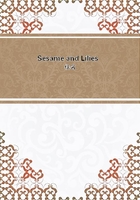
第7章
Do not think it. Great men do not play stage tricks with the doctrines of life and death: only little men do that. Milton means what he says; and means it with his might too--is going to put the whole strength of his spirit presently into the saying of it. For though not a lover of false bishops, he WAS a lover of true ones;and the Lake-pilot is here, in his thoughts, the type and head of true episcopal power. For Milton reads that text, "I will give unto thee the keys of the kingdom of heaven," quite honestly. Puritan though he be, he would not blot it out of the book because there have been bad bishops; nay, in order to understand HIM, we must understand that verse first; it will not do to eye it askance, or whisper it under our breath, as if it were a weapon of an adverse sect. It is a solemn, universal assertion, deeply to be kept in mind by all sects. But perhaps we shall be better able to reason on it if we go on a little farther, and come back to it. For clearly this marked insistence on the power of the true episcopate is to make us feel more weightily what is to be charged against the false claimants of episcopate; or generally, against false claimants of power and rank in the body of the clergy; they who, "for their bellies' sake, creep, and intrude, and climb into the fold."Never think Milton uses those three words to fill up his verse, as a loose writer would. He needs all the three;--especially those three, and no more than those--"creep," and "intrude," and "climb;"no other words would or could serve the turn, and no more could be added. For they exhaustively comprehend the three classes, correspondent to the three characters, of men who dishonestly seek ecclesiastical power. First, those who "CREEP" into the fold; who do not care for office, nor name, but for secret influence, and do all things occultly and cunningly, consenting to any servility of office or conduct, so only that they may intimately discern, and unawares direct, the minds of men. Then those who "intrude"(thrust, that is) themselves into the fold, who by natural insolence of heart, and stout eloquence of tongue, and fearlessly perseverant self-assertion, obtain hearing and authority with the common crowd.
Lastly, those who "climb," who, by labour and learning, both stout and sound, but selfishly exerted in the cause of their own ambition, gain high dignities and authorities, and become "lords over the heritage," though not "ensamples to the flock."Now go on:-
"Of other care they little reckoning make, Than how to scramble at the shearers' feast.
BLIND MOUTHS--"
I pause again, for this is a strange expression; a broken metaphor, one might think, careless and unscholarly.
Not so: its very audacity and pithiness are intended to make us look close at the phrase and remember it. Those two monosyllables express the precisely accurate contraries of right character, in the two great offices of the Church--those of bishop and pastor.
A "Bishop" means "a person who sees."
A "Pastor" means "a person who feeds."
The most unbishoply character a man can have is therefore to be Blind.
The most unpastoral is, instead of feeding, to want to be fed,--to be a Mouth.
Take the two reverses together, and you have "blind mouths." We may advisably follow out this idea a little. Nearly all the evils in the Church have arisen from bishops desiring POWER more than LIGHT.
They want authority, not outlook. Whereas their real office is not to rule; though it may be vigorously to exhort and rebuke: it is the king's office to rule; the bishop's office is to OVERSEE the flock; to number it, sheep by sheep; to be ready always to give full account of it. Now it is clear he cannot give account of the souls, if he has not so much as numbered the bodies, of his flock. The first thing, therefore, that a bishop has to do is at least to put himself in a position in which, at any moment, he can obtain the history, from childhood, of every living soul in his diocese, and of its present state. Down in that back street, Bill, and Nancy, knocking each other's teeth out!--Does the bishop know all about it?
Has he his eye upon them? Has he HAD his eye upon them? Can he circumstantially explain to us how Bill got into the habit of beating Nancy about the head? If he cannot, he is no bishop, though he had a mitre as high as Salisbury steeple; he is no bishop,--he has sought to be at the helm instead of the masthead; he has no sight of things. "Nay," you say, "it is not his duty to look after Bill in the back street." What! the fat sheep that have full fleeces--you think it is only those he should look after while (go back to your Milton) "the hungry sheep look up, and are not fed, besides what the grim wolf, with privy paw" (bishops knowing nothing about it), "daily devours apace, and nothing said"?
"But that's not our idea of a bishop."Perhaps not; but it was St. Paul's; and it was Milton's. They may be right, or we may be;but we must not think we are reading either one or the other by putting our meaning into their words.
I go on.